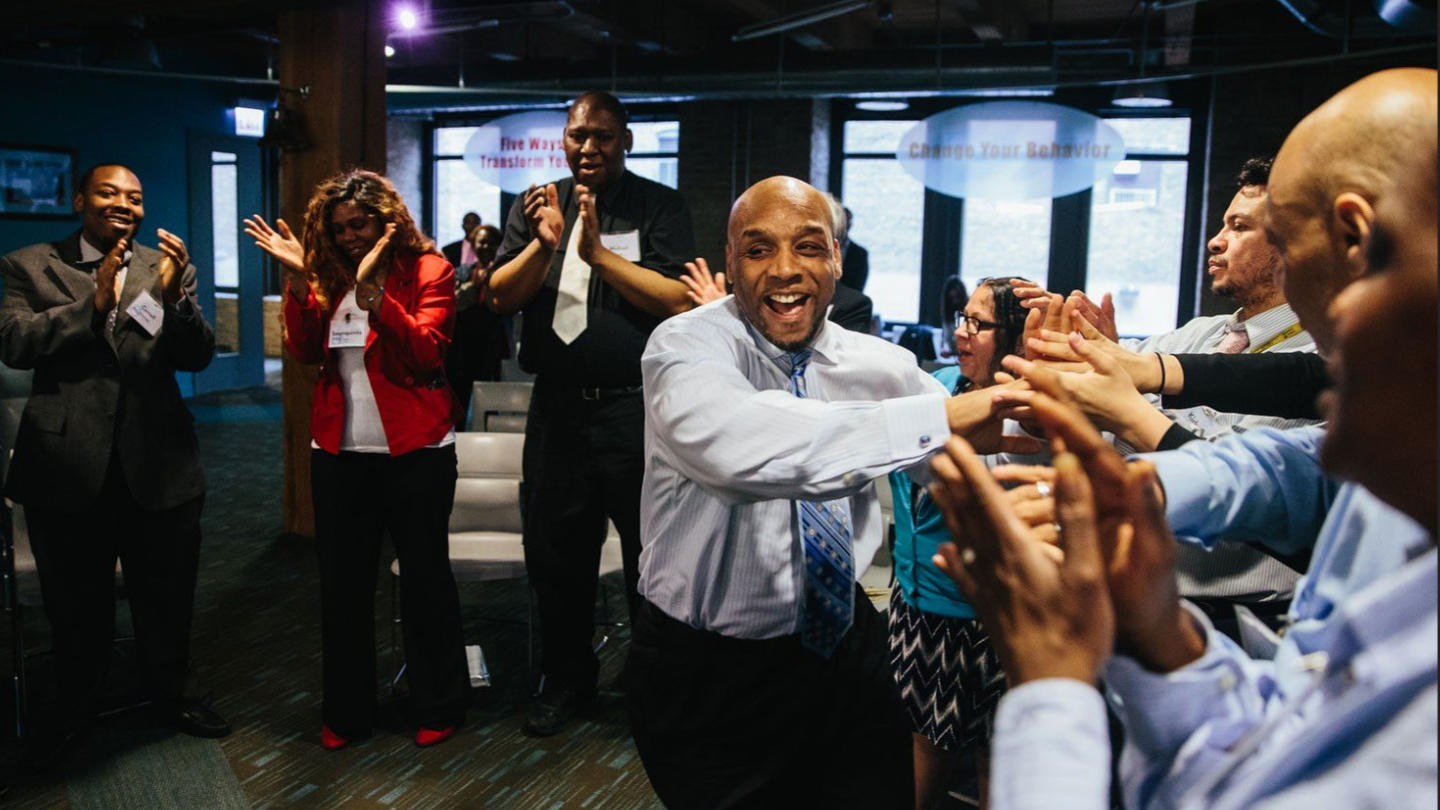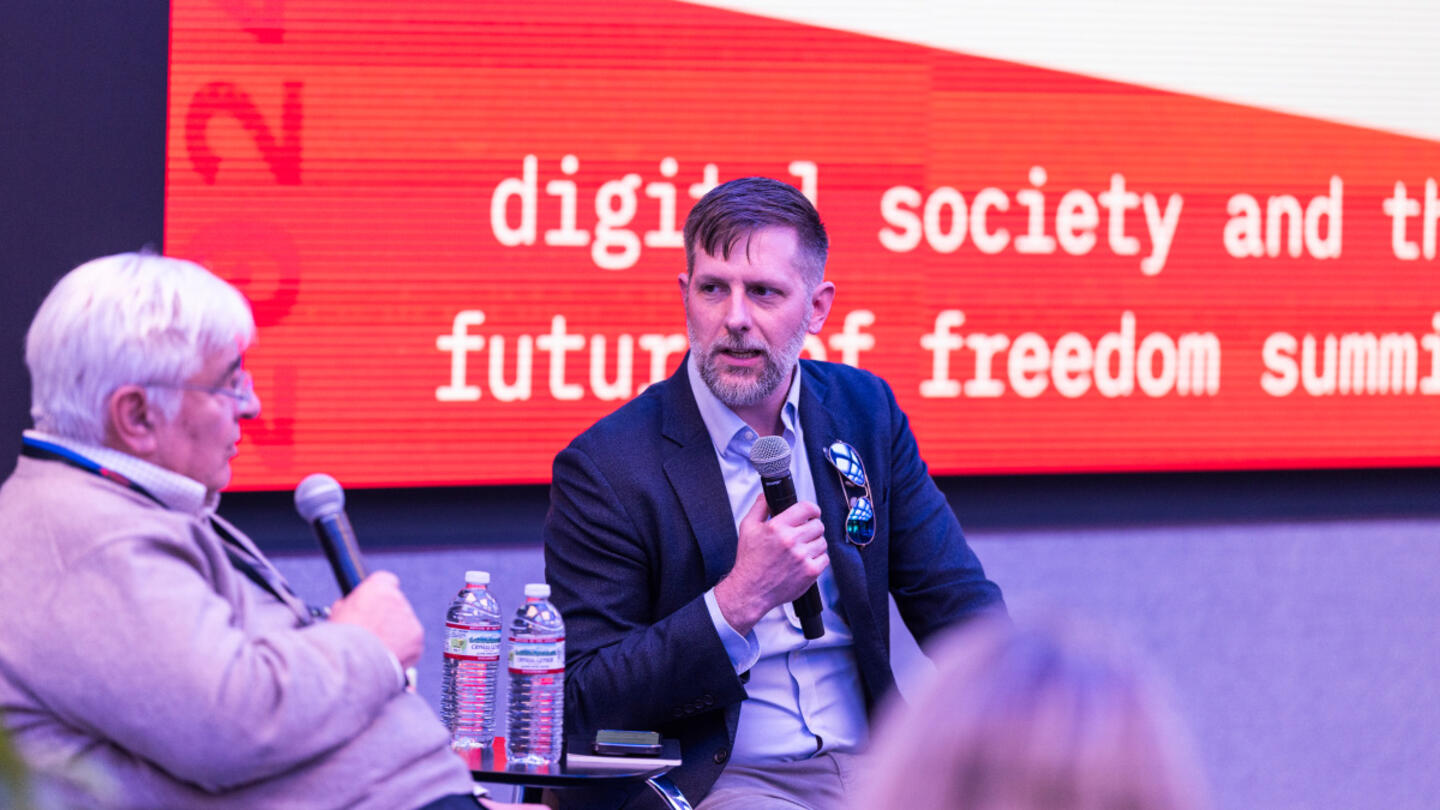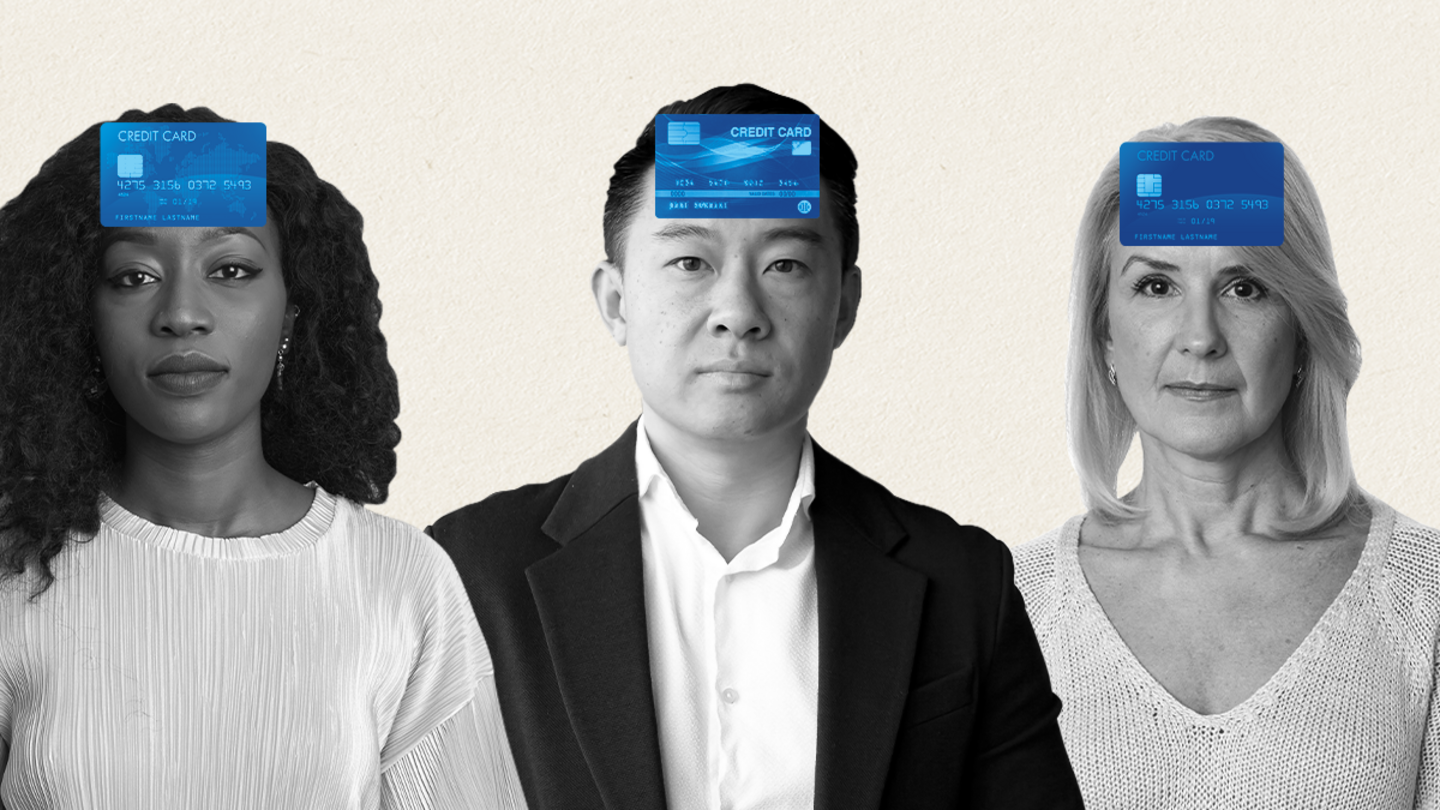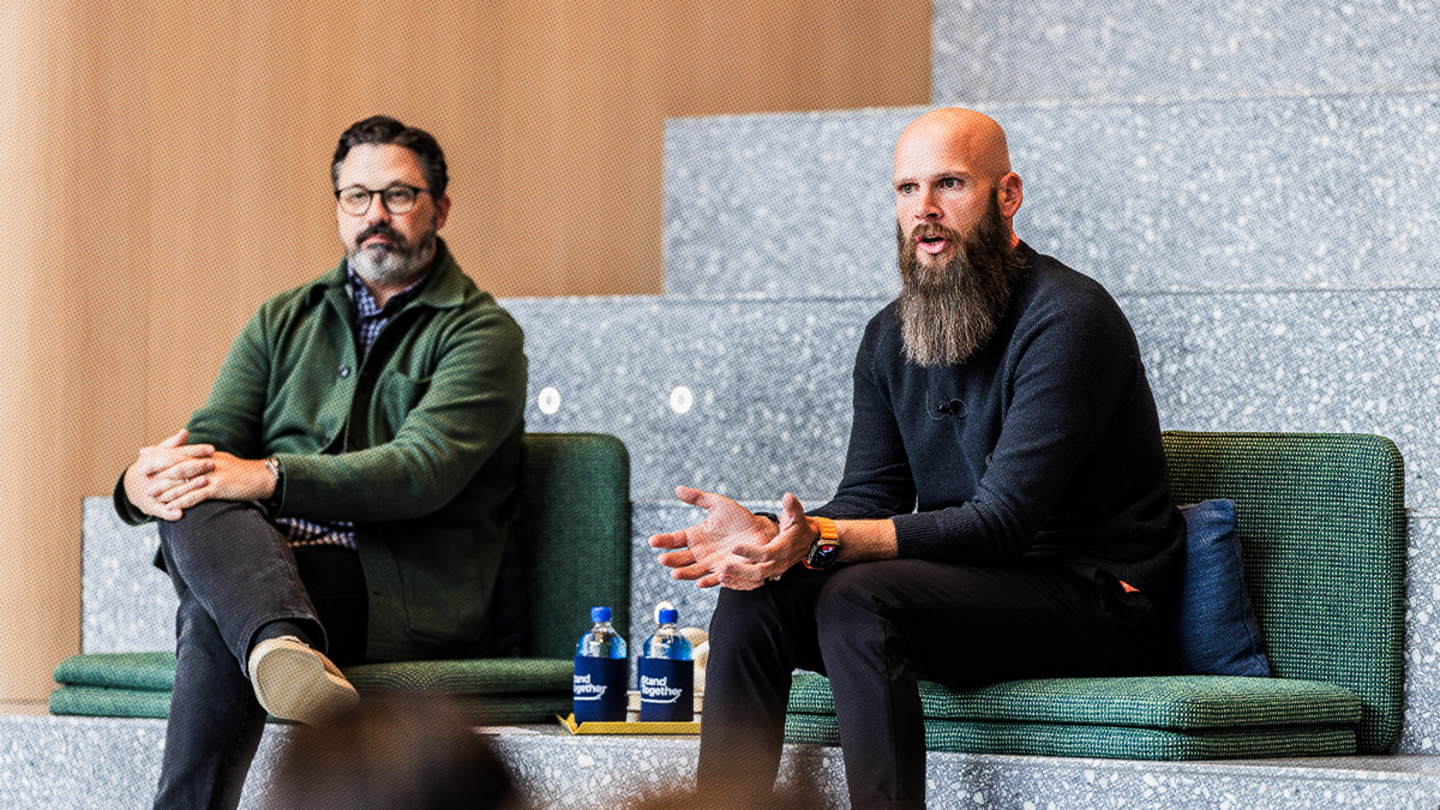Hollowed out by years of insults and harrowing assaults from her husband, it was a drive to survive that kept Odette Jose Rivera in her chair that first day. Now on her own with three young girls to protect and provide for, she knew she couldn't fail.
"If I were to ask your oldest daughter 'what is Cara,' would she know? What do you think she'd say?" I ask.
Odette thinks back to when her college-essay-writing-treasure was just learning to read and guesses carefully: "She would probably say that it helped mom survive, and stay, and keep us safe."
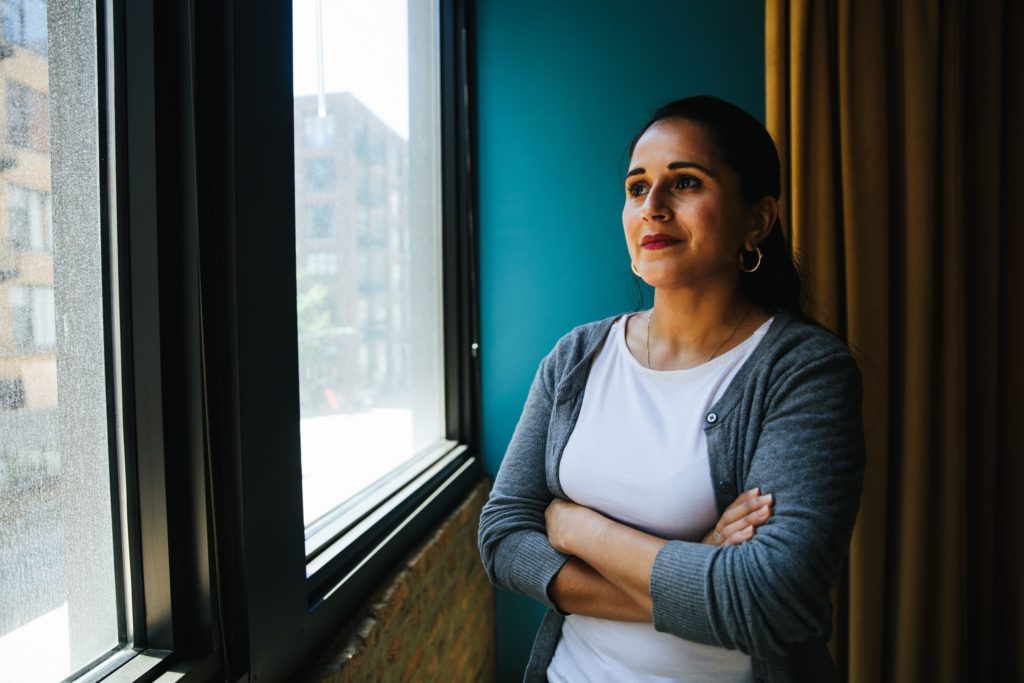
There was no margin for error then. Needing work urgently, with little recent relevant experience, Odette came to Cara looking for help finding a job. But like many overcoming trauma, or in recovery, she was a shell of herself. Whatever internal space had been created by her escape was quickly flooded with fear, guilt, and shame that she hadn't been able to prevent the situation in the first place.
At Cara, this is the deep work that gets done and the first thing addressed. Day one begins with a mirror, as participants learn to face themselves. If all goes well, in just four weeks they will begin facing potential employers in interviews—confident and competent. It's a little miraculous, when you think about it.
It was only a couple of weeks before Odette got the job at Marriott. A consummate professional with everything on the line, she began at the front desk and was promoted twice to supervisor roles. After four years, she began taking night classes at Malcom X College, first earning her Associate's degree, then transferring to Roosevelt University to earn her Bachelor's and Master's in clinical psychology.
"It was always my dream to have an education. Cara really engrained in me—don't relax, there's always something more that you could be doing. There's always room for growth."
Odette Jose Rivera, Cara Alumn
Today, thirteen years after her "day one" at Cara, Odette is a therapist at Malcom X College working with students as they face homelessness, addiction, trauma, and poverty. "It's very fulfilling and it has a lot of meaning in my life to be able to give back, because there was always someone there giving to me," she says.
Vicki Hudson-Stapleton has been one of those someones for hundreds of graduates. She now oversees Cara's curriculum, working alongside Jesse Teverbaugh, affectionately nicknamed Mr. Jesse. A graduate himself, Jesse has been leading transformations at Cara for the past 16 years, which means every five-weeks he relives the darkest days of his life on purpose.
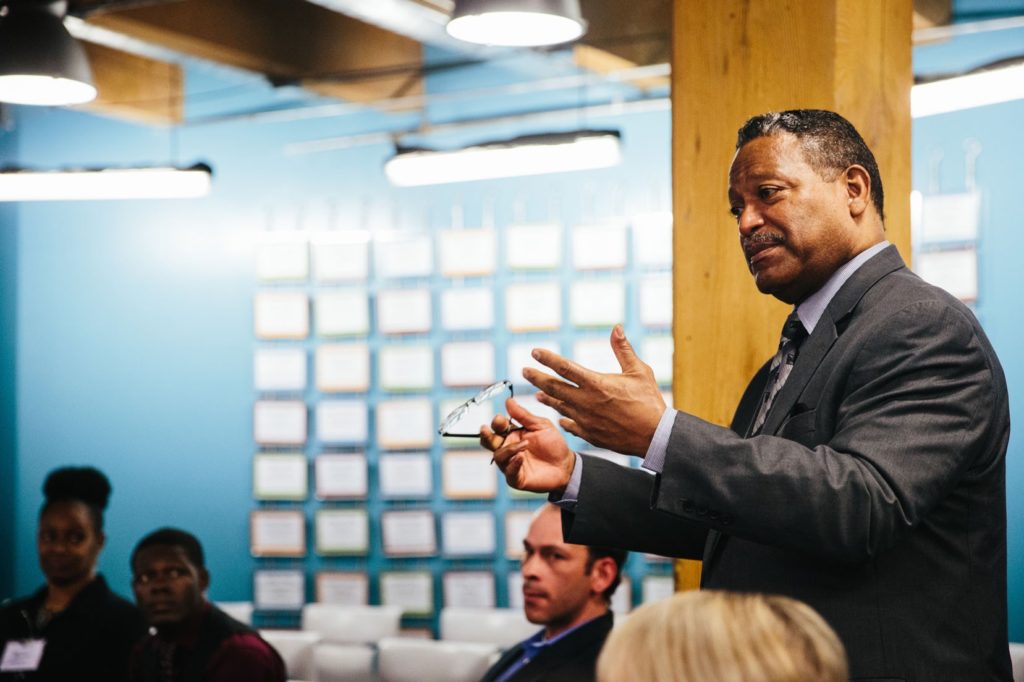
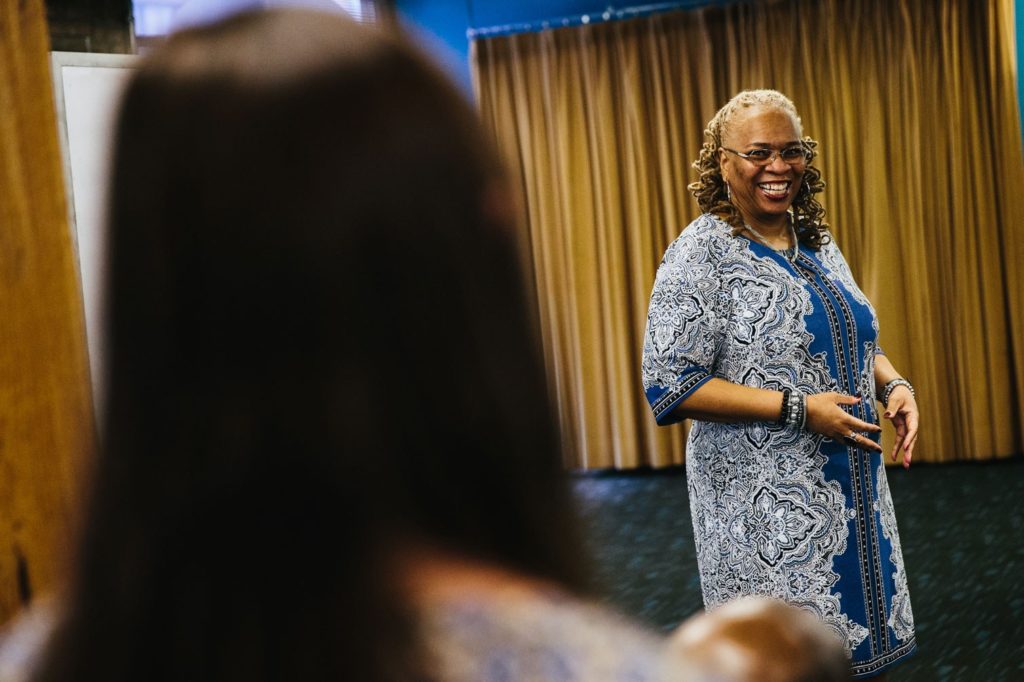
"For every new cohort we bring through our program, Jesse puts himself out there with his own story of recovery from depression, addiction, a broken heart, in front of 60 people," says Maria Kim, Cara's President and CEO. "That's just what we do here."
"We want to stop the transfer of poverty to the next generation. Our average age is about 39 years old, so we're talking about many individuals who are moms and dads. How are we making sure that their opportunity unlocks opportunity for their kids?"
Maria Kim, President + CEO
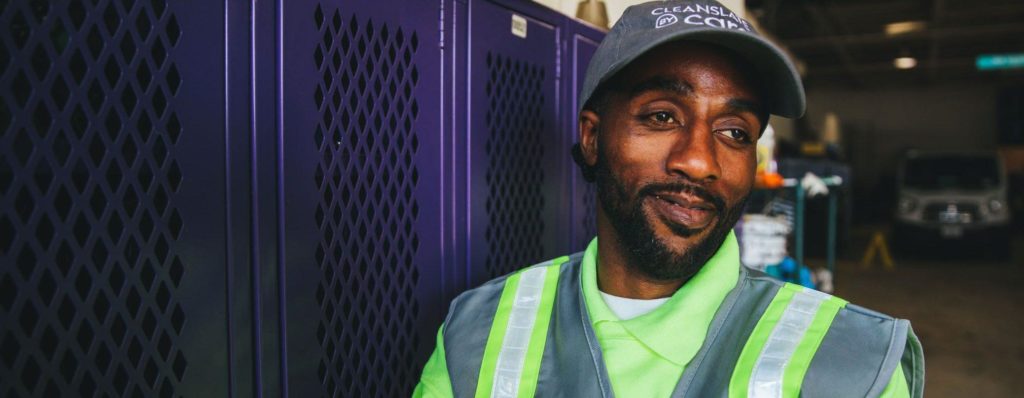
The four weeks
"We always say we have a long way to go and a short time to get there," says Vicki. "Everything that has happened in your life is not going to evaporate or even get better within these four weeks. We have to go in on day one creating trust and letting them know we really are there for their best interests."
The goal is to move people from beat down and barrier-ridden to professional and prepared in four weeks. Those with perfect attendance, impeccable punctuality, professional presentation, and articulate communication will be deemed 'Send Out Eligible (SOE),' which essentially means job-ready.
"That's where I'm at," says DeAndre Ross, one of the first faces you'll see at Cara. "Since I started, I've never missed a day. I want Cara to know that they can depend on me. When they call up those companies [employment partners] and say, 'Hey, I got this guy over here that I want you to meet.' They know that I am going to be on time. That I am going to give 100%. That I'm going to represent myself and Cara to the best of my ability."
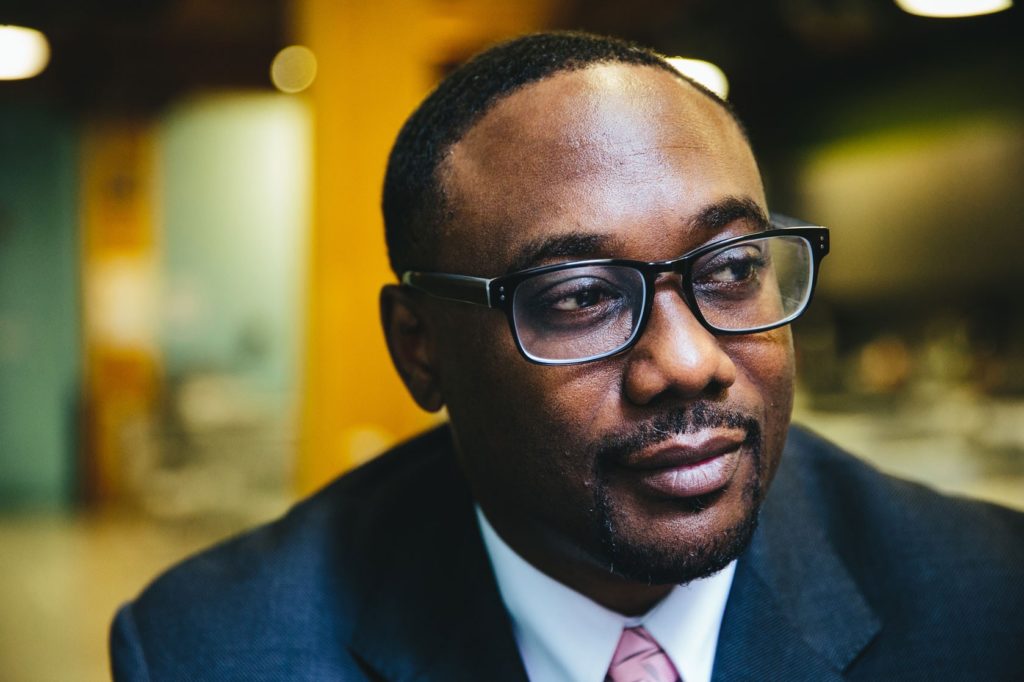
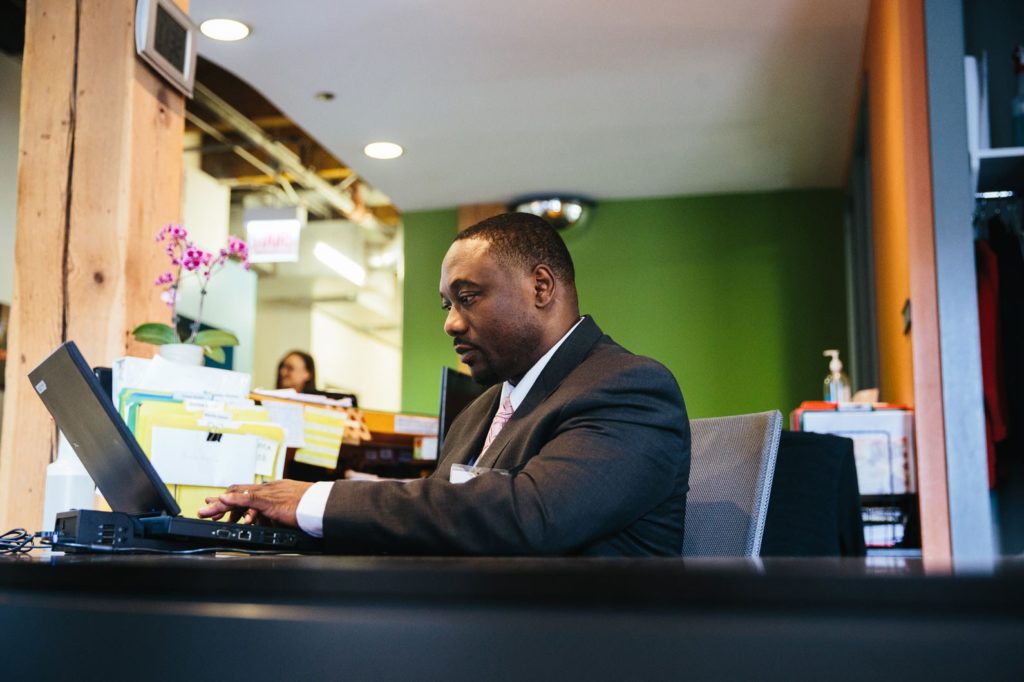
He's got the Cara competencies down: Professionalism, communication, team building, time management, and conflict resolution. Participants have to excel in all five to become SOE.
"This really is about everybody getting to know who they are, knowing their deepest truth, finding their voice and knowing that they are worthy of the best that life has to offer," says Vicki, "and it's okay to restore from the core and let that sugar honey ice tea go."
It's a monumental task, but they have lots of support from Cara coaches like Da'Sean Hillsman, a graduate himself.
Nearly 30% of Cara staff are Cara graduates.
"What's your story?" I ask him, and he's gracious in his reply.
"I came here fresh out of prison, okay. I came here fresh out of prison and I was wondering, 'What am I going to do next? Am I going to look for a job, or am I going to go back to the life I know—or once knew—how to live?' I've only been to prison one time, but whether it's one time or twenty times, it's still hard to get an employer to believe in you," he admits.
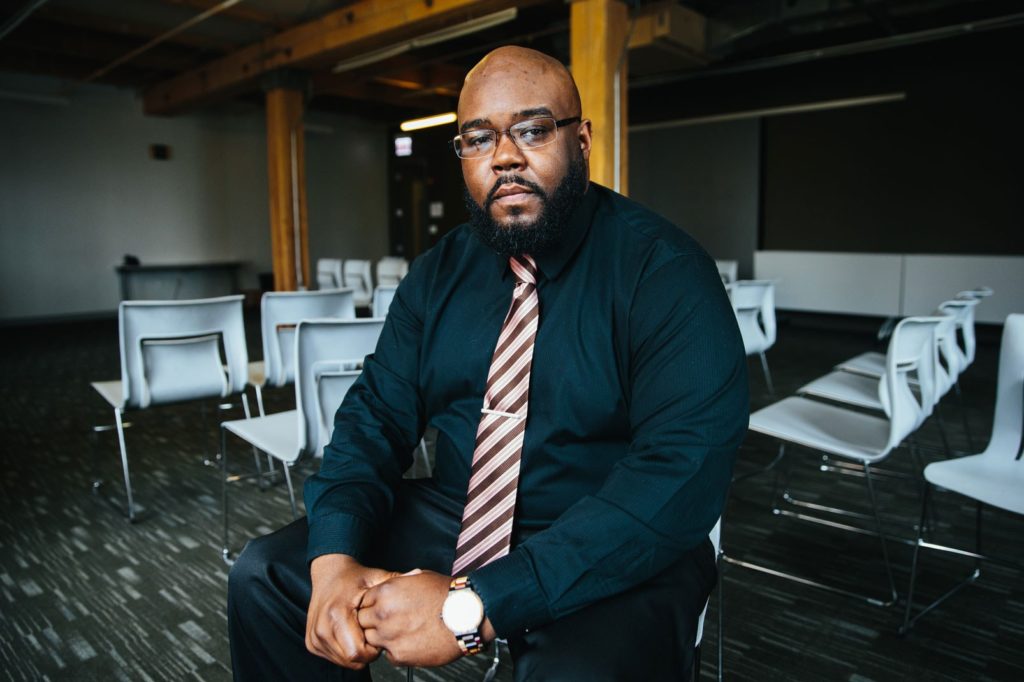
After his four weeks, Cara placed him in a janitorial job with a large cleaning services company. "I took that job and I made it my best," says Da'Sean. "Even though I was cleaning, I cleaned as if I was making a million dollars an hour."
Seeing many returning citizens find their way to Cara after serving their time, Da'Sean was eager to leverage his past to build another's future. From his role as janitor, he took his coach's advice and applied to become a coach himself—or, more technically, an Individual Development Specialist (IDS).
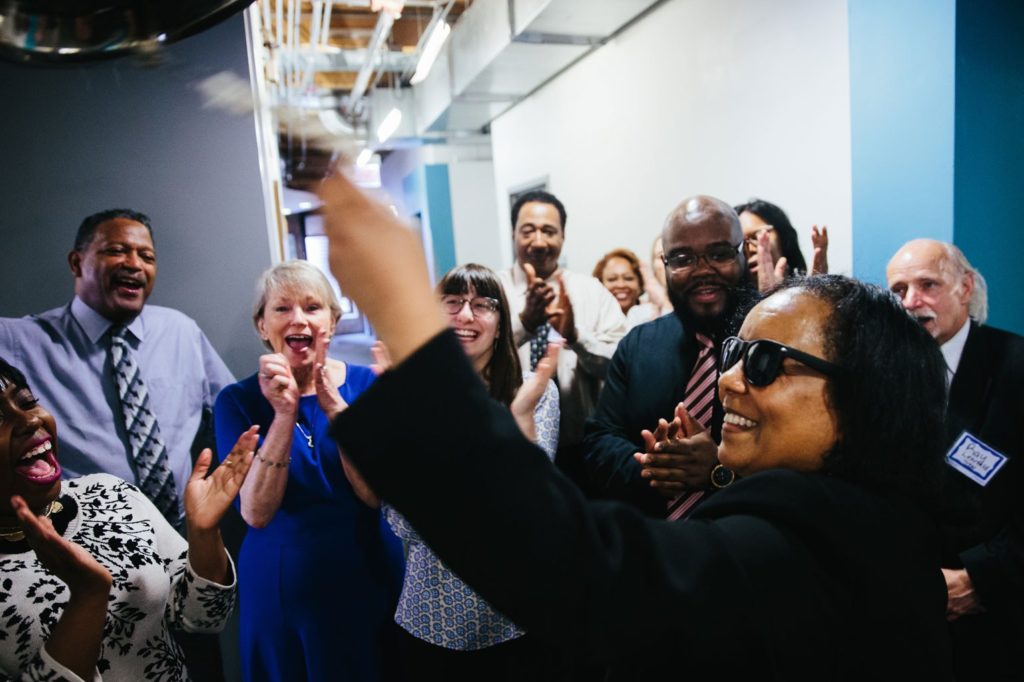
In just a few minutes we'll celebrate one of his favorite moments—the ringing of the bell when someone gets a job. This time it's for Tati, one of his mentees. On Monday, Tati will begin work at the Marriott downtown and she's thrilled.
"Every individual is creative, resourceful and whole. We are not schooling anybody," says Maria. "The strengths and the motivation are already inside of people. So, we want to be more like locksmiths rather than teachers."
"My children don't see the ex-offender. All they see is a loving father that gets up every day, goes to work, and makes sure that they have a roof over their head and food in their mouth. Someone that loves them and won't judge them, regardless of what they do. I'm happy with my life now and that Cara gave me that chance."
Da'Sean L. Hillsman, Sr., Senior Individual Development Specialist
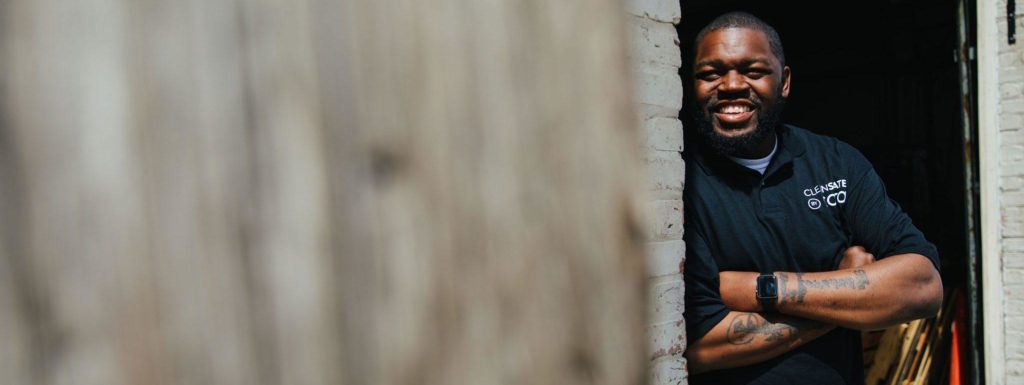
Getting to work
Every Cara participant is assigned to an IDS like Da'Sean, who coaches through finding, applying, and landing a job, and then another IDS who coaches through keeping that job for at least a full year.
"We work with individuals on a personal level," says Da'Sean, "Anything that would hinder them from completing a program, any personal life mishaps, they'll come and talk to their IDS about that. We focus on health, family, homes, any personal thing that they need help in."
Once they achieve one year on the job, they are considered a graduate of Cara and their plaque is added to the Great Wall. It's a really big deal, a ceremony and celebration with all their family and friends.
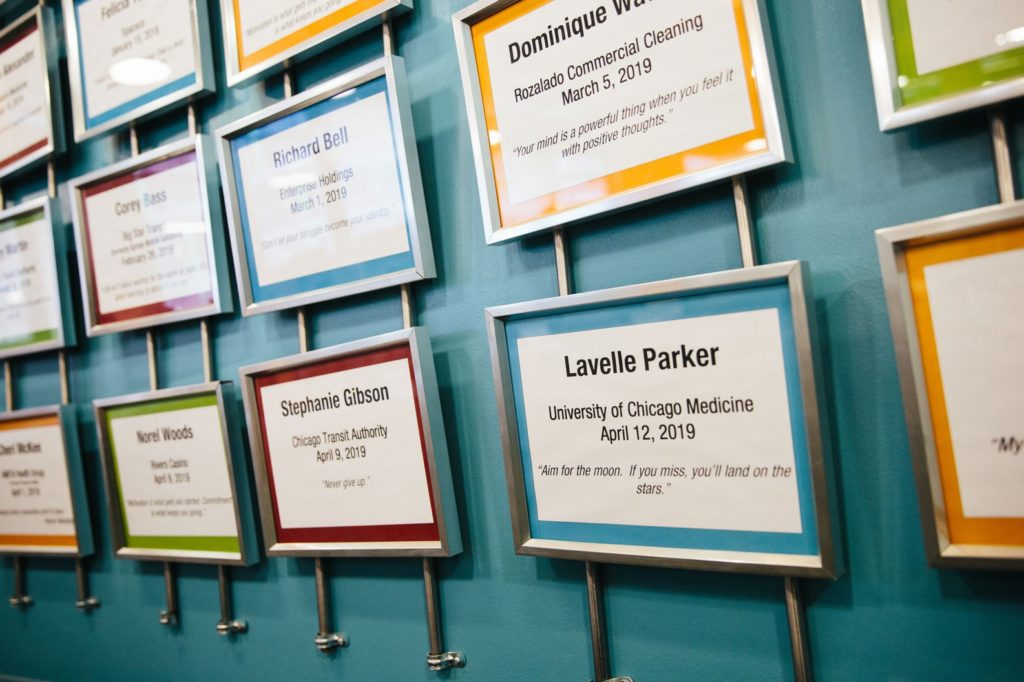
"It's very much a rite of passage to come back to your Great Wall ceremony," says Nora Vail, Manager of Coaching and Retention. "It's very celebratory and also motivational for the newer folks who are maybe starting to wonder, 'What comes after this? Do people like these jobs? Do people keep these jobs?' To have an actual face to tell the story of what can happen when you land that job is really powerful to everybody."
78% of Cara participants achieve this milestone, which is about 28 points higher than the industry average. Lavelle Parker hit this milestone just a couple of weeks ago.
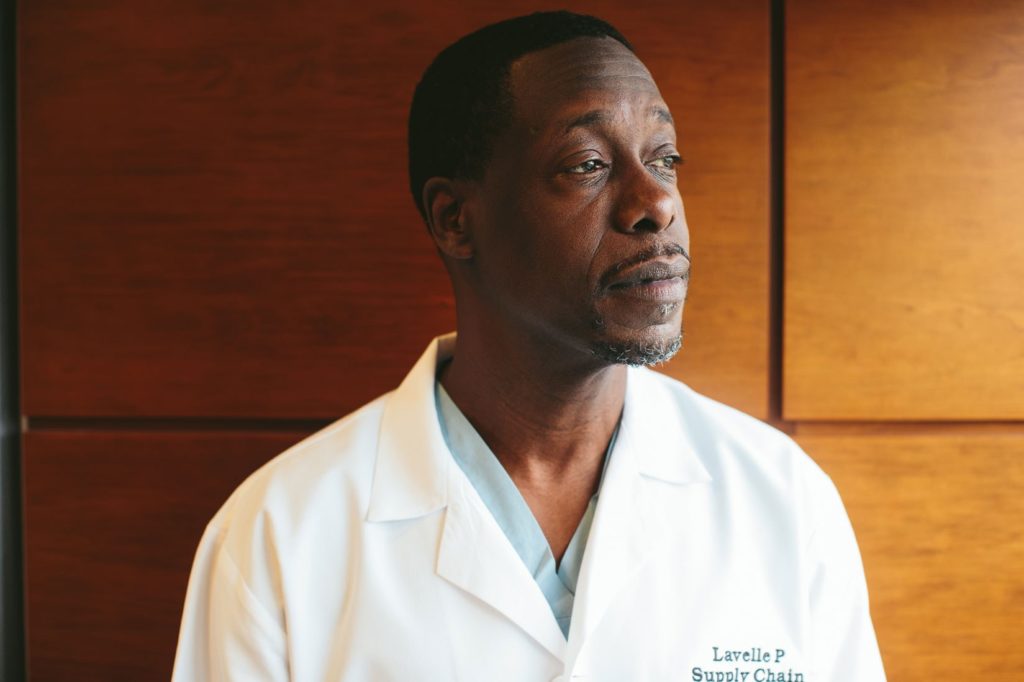
Should you ever find yourself in surgery at the UChicago Medicine, you might appreciate knowing the supplies for that surgery were stocked diligently, meticulously by Lavelle, one of Cara's most capable. Every night, Lavelle and his coworkers unpack three semitrucks worth of medical supplies and wheel them through the hospital arteries to requisite carts and closets.
"I get a chance to help somebody that's not in a position to help themselves, right? Without the people behind the scenes, it would be challenging to make that surgery happen. So, my job feels important, like I did something, my small contribution to the world, I guess," Lavelle says smiling.
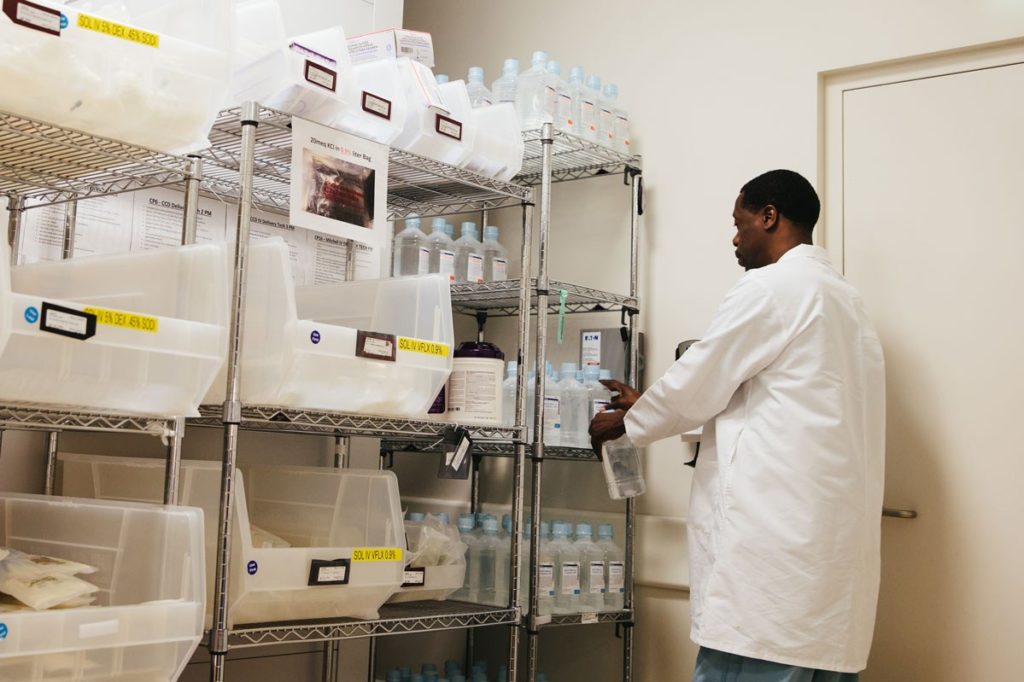
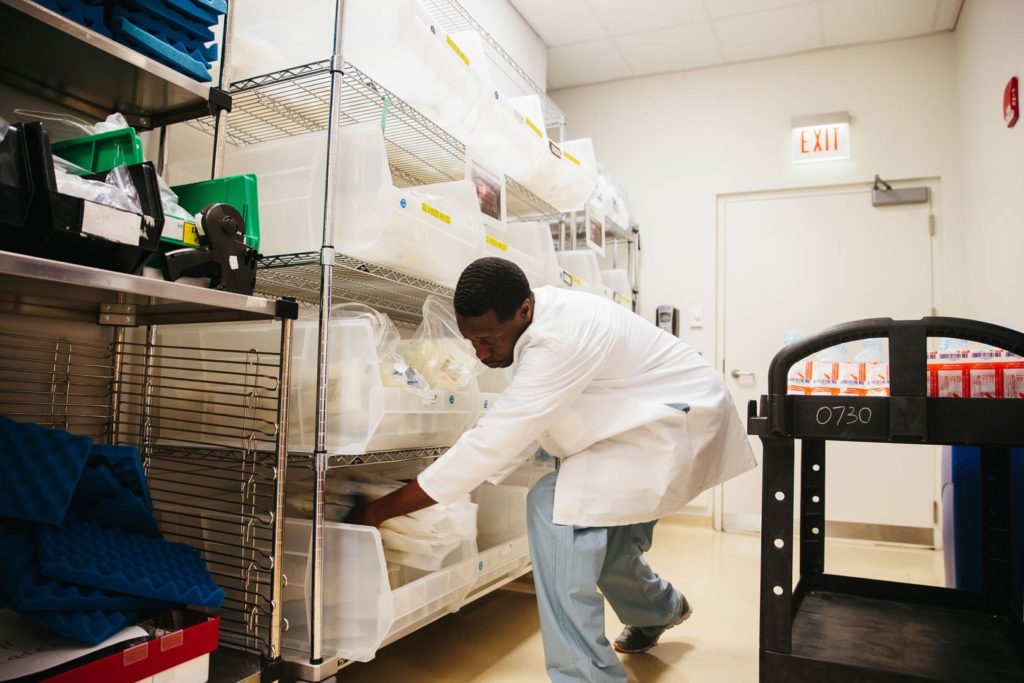
Having hired nearly 50 Cara participants, UChicago Medicine is one of Cara's leading employment partners.
"The folks that we get from Cara are so well prepared, they become our standouts," says Bob Hanley, UChicago Medicine's Chief Human Resources Officer.
"But tell me about your early concerns," I say, "what were your greatest hesitations as you got started with Cara?"
"Well, the question of quality in candidates and employees is one you worry about. You worry about not getting the high-caliber talent that you want and deserve," he answers, "But I gotta tell you, when you get to know the Cara organization and the rigor that they put participants through to reenter the workforce as responsible employees, your concerns are relieved. When you start experiencing some of them and you see the retention and reliability and dependability, it becomes a non-issue frankly."
"We've had four dozen placements from Cara and no issues with any one of them—they are model employees."
Bob Hanley, Chief Human Resources Officer, UChicago Medicine
Since opening a year ago, the new UChicago trauma center has become the busiest in the city and Cara has played an integral role in staffing it. "Months and months of planning made it clear we were going to need staffing and going to need it quickly," remembers Bob. "We turned to organizations, particularly Cara, to help us do that. What was nice was that we were able to source people quickly, bring them in on a temporary status, and then over time make them permanent."
What makes Cara's services different from other workforce development agencies or similar agencies is that Cara really invests in retention: To have a team of six full-time staff members who do retention-focused work is rare, and yields a job retention rate 28 points higher than the industry average.
"You know, a lot of times, it takes time to pick up the pieces in your life, especially when some of those pieces can be pretty heavy. But Cara helped lighten the load, I can tell you that."
Lavelle Parker, Cara Alumni, Senior Stock Clerk at UChicago Medicine
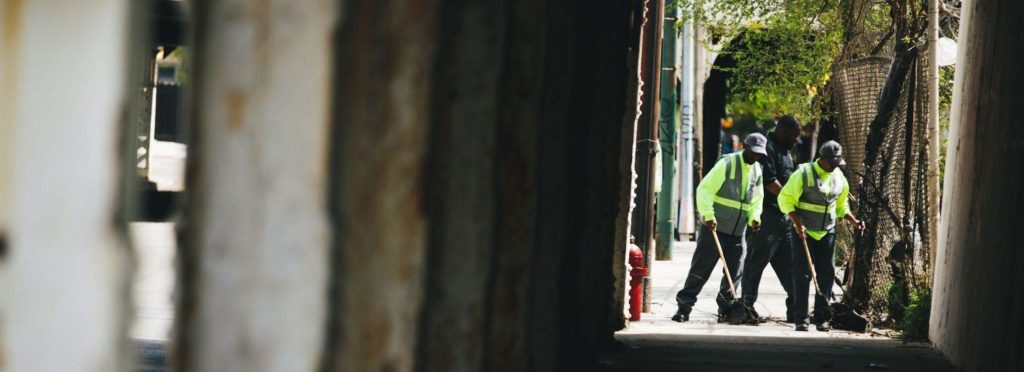
Cleanslate
Cara has launched two social enterprises to ensure right-fit solutions for employment partners and adequate training for job candidates. Cara Connects operates a staffing agency, providing pre-screened, drug tested, background checked and professional-level candidates for contract, contract-to-hire, and direct hire opportunities. This is how UChicago Medicine was able to quickly staff its new trauma center with locally sourced, high-quality candidates like Lavelle.
In 2018, 521 employees and interns at Cara's second social enterprise, Cleanslate, collected 1,596 tons of garbage and 392 tons of recyclables, removed 32,039 graffiti tags, and plowed 4,132 tons of snow across 34 Chicago communities, serving more than 71 customers.
Started in 2005, Cleanslate is a profitable $3.5 million business that produces about 400 transitional jobs per year.
"We are a neighborhood beautification program. We do graffiti removal, snow removal, landscaping, garbage removal. We provide all types of services with a smile," says Crew Chief Corinthian Gladney, genuinely and proudly.
Corinthian Gladney grew up in Garfield Park on the west side of Chicago. His father worked in streets and sanitation for thirty years and his mother spent twenty years working for the Board of Education, teaching at a home for girls on the side. Neglecting his parents' example and work ethic, Corinthian dropped out of college to find what he was missing in the streets, which landed him in prison with a 10 year sentence. Returning home at 32, Corinthian responded to a Cleanslate advertisement and called to apply. Given his Associate's Degree and previous work experience, Cara fast-tracked him into an internship.
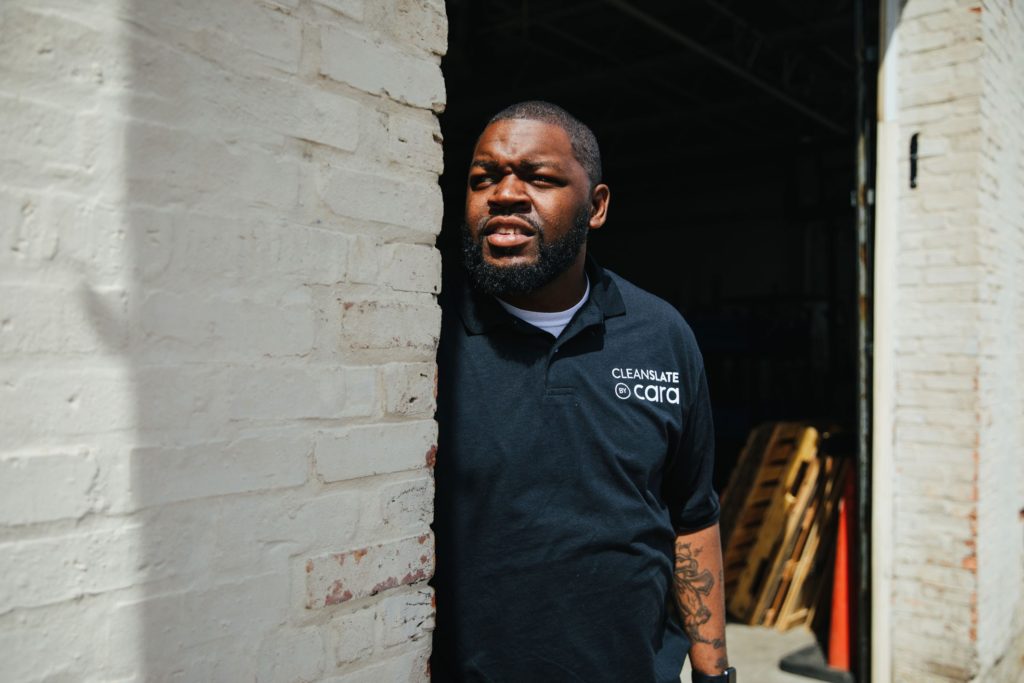
With a twelve-year-old son at home, he knew he wanted to make a change and do his level best to stay home. "I paid attention. I asked questions. I made sure I did things the way I was told, and then some things I just went above. On my off days, I called in asking if they needed help. Every day, I was calling and asking." After just a few months, Corinthian was promoted to Crew Chief.
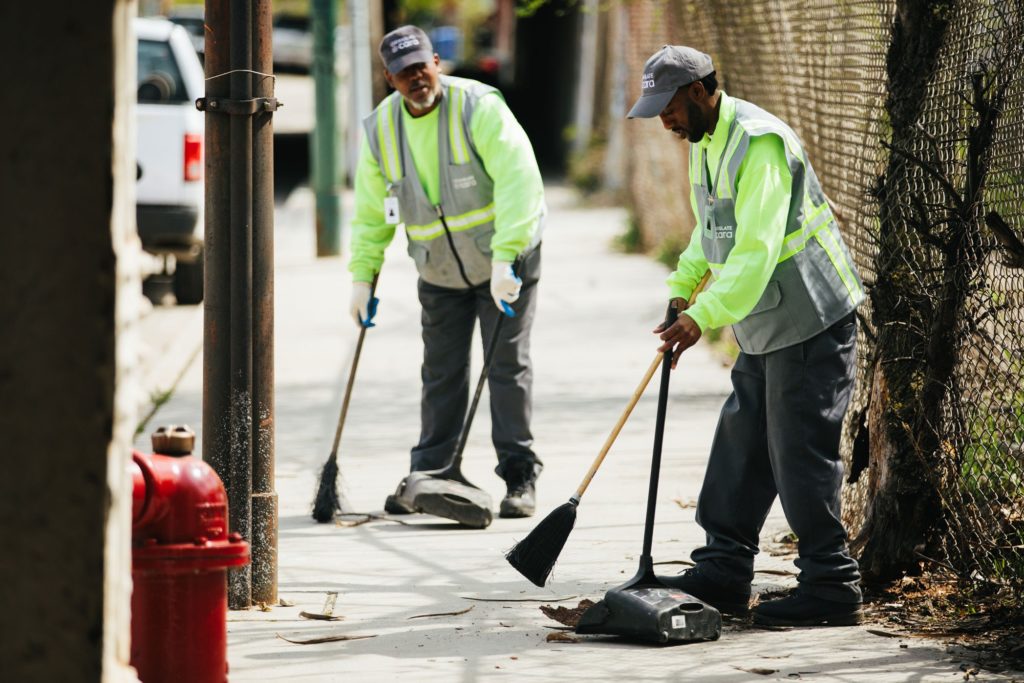
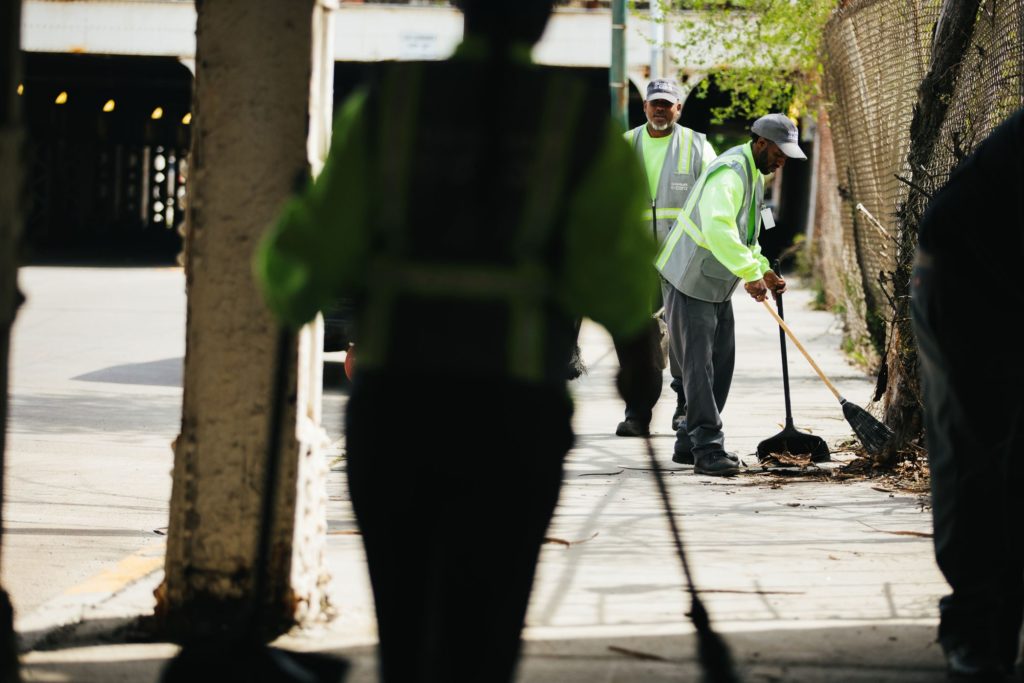
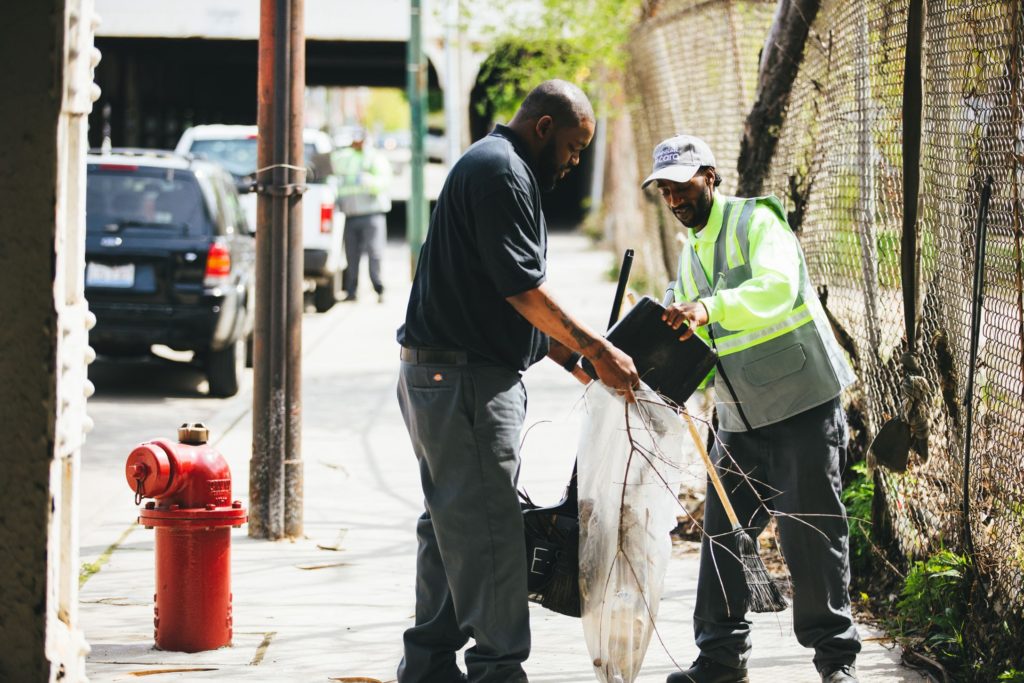
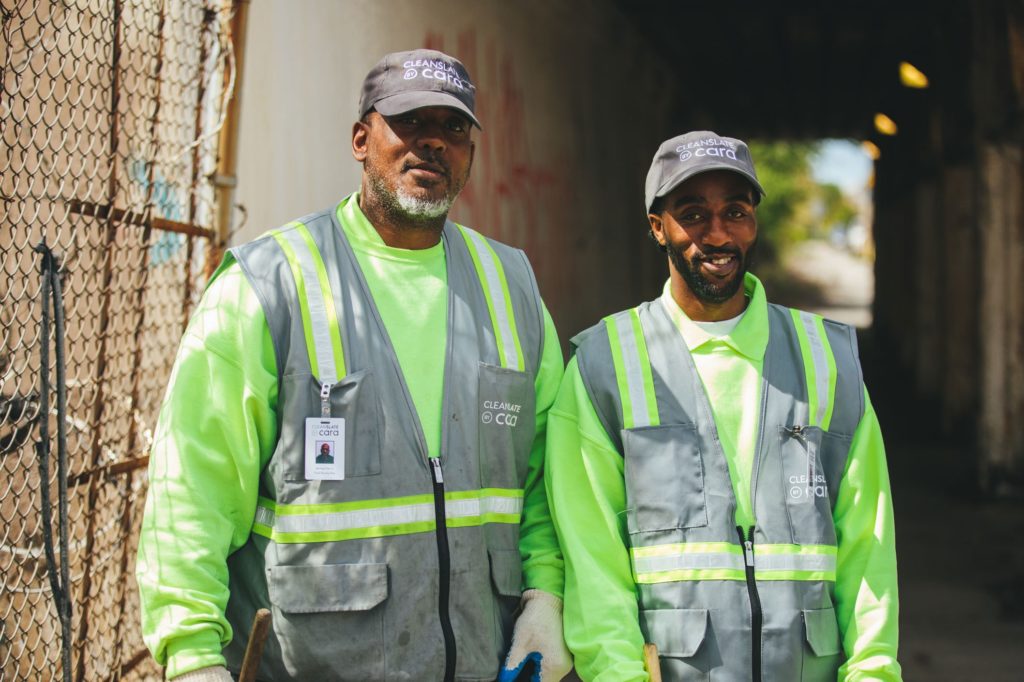
"Being in Chicago, I feel like I can help clean it up, make it look good. That was something I always wanted to do anyway, something to give back," he says.
LaTosha Moore is on his crew and shares his appreciation for the work. "We sweep the curb and the sidewalk," she says, "Sweeping up cigarette butts, taking the trash away, changing the bags in the trash cans. It just really warms my heart to know that I'm doing something to give back to the community."
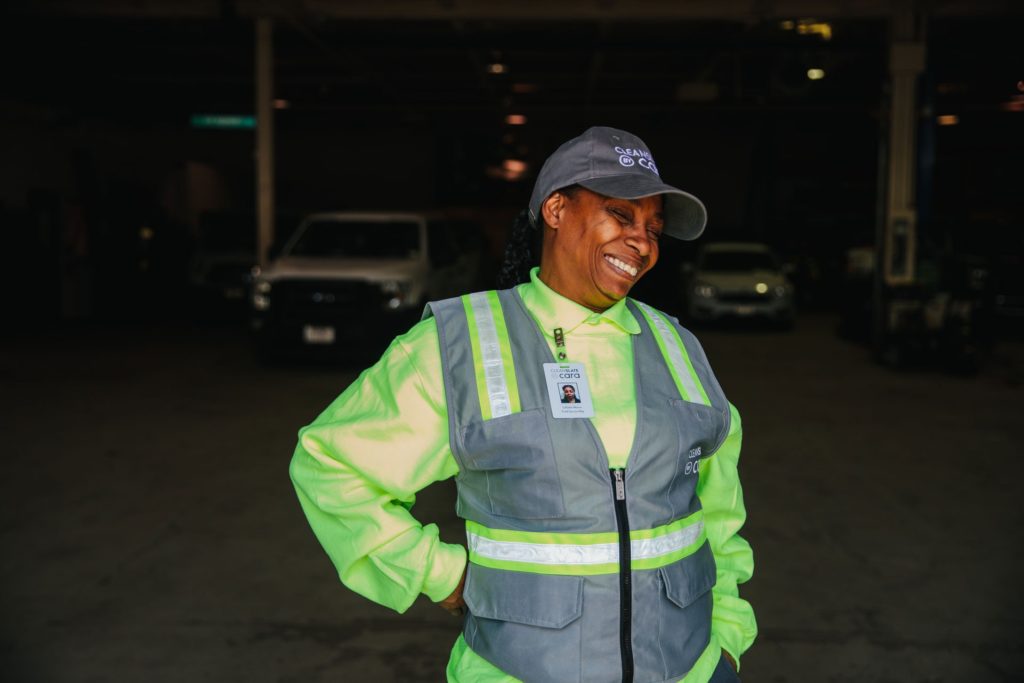
"I'm good at what I do and do it to the best of my ability. As Mr. Jesse would say, 'Give a 100 percent.' And I do that. I'll go above and beyond to get the job done in a fast and timely manner," says LaTosha.
There are many workforce development programs around the country, but few with the retention rates and impressively profitable social enterprise experience that Cara has built. Part of that is surely due to the fact that support through job placements continues for a full year. Other agencies doing similar work might do three months of support beyond the start date on a job, or six months, but it's rare to see a workforce agency that has a full year of supportive coaching.
"I've been to other places that help people get jobs and stuff like that," says Corinthian, "But for some reason, Cara felt more genuine. They really care and want to help. I felt that the first day and that's what made me stick through, to be honest. It almost felt like if I had given up, I'd have let them down."
"For us, it's not just about getting a job, it's about keeping the job that you get," says Nora.
"Everyone is in recovery. Being vulnerable and recognizing the mutuality of that experience is the only way that we build the trust to help unlock some of these stressors from the past and also unlock opportunities for the future. Everything else is a little bit of window-dressing, and a lot of people can do it. I think where we differentiate is in the one-to-one connection with people to be an ally with them on the journey because we're immersed in it ourselves."
Maria Kim, President + CEO
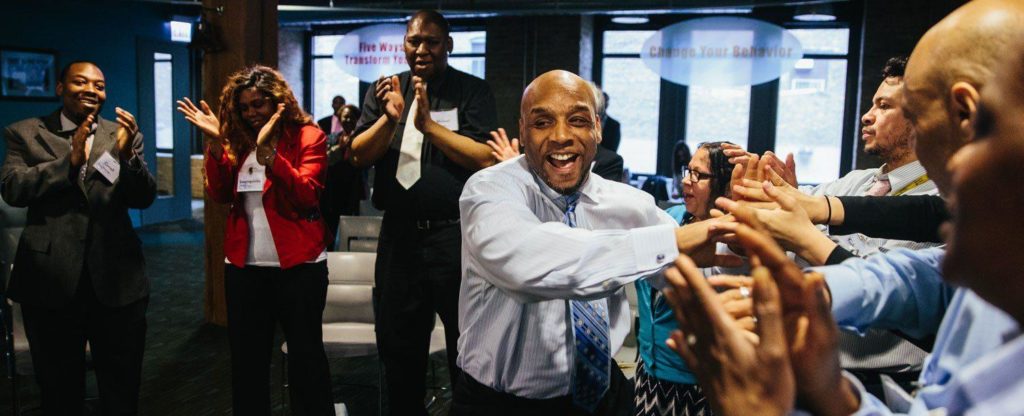
Mutual motivations
Mutuality begins with medley in Cara's Motivations, everyone perfectly off key and on rhythm: "We are family, I got all my sisters and me…What you want, Baby I got it, What you need, You know I got it, All I'm asking, Is for a little respect…just a little bit, just a little bit…"
Michael stands up in the center of the circle and introduces himself. He introduces the morning's topic, a question inviting reflection and group vulnerability: In the past week, who has inspired you to give 100% and what did they do specifically? Michael shares for two minutes and leads the group back into song before tapping a next person to share.
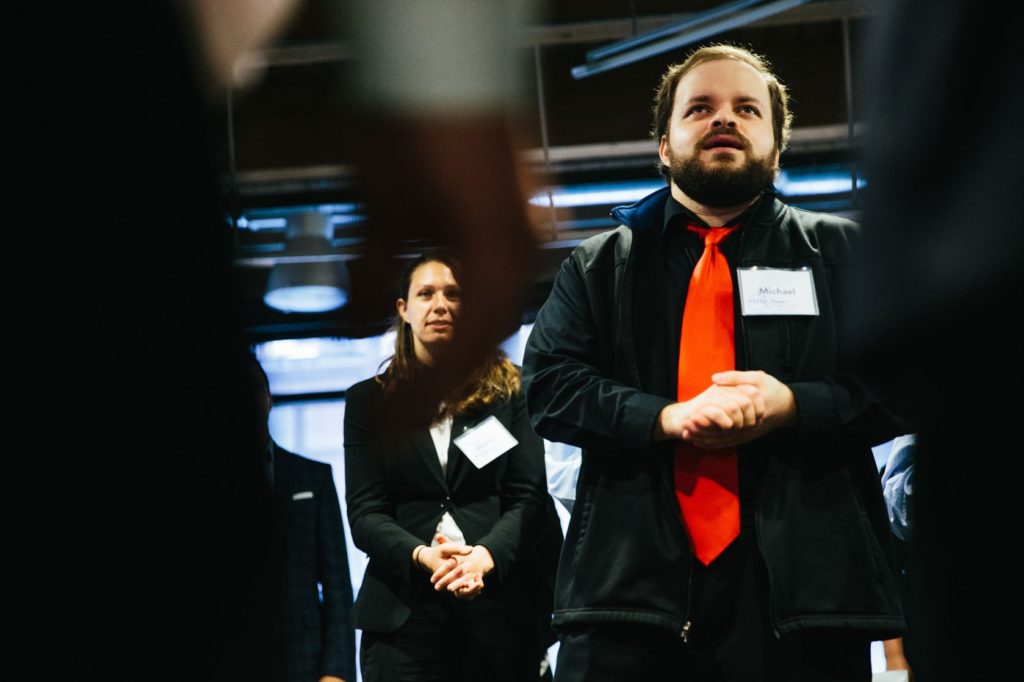
The pattern continues as several others take their turns. Inevitably there are tears, as raw hearts share for real. The class bonds quickly and builds into a supportive community that many have never had.
Everyone participates. Even Maria has had her turn in the middle, in tears: "My go-to song is, 'Papa Was a Rolling Stone.' We talk about this recognition that we are all in recovery. I am in recovery of a broken heart, not from a lover, more from the father who raised me, who left my family when I was 17. I'm 47 now and there's not a day that goes by that I don't think about that at least once."
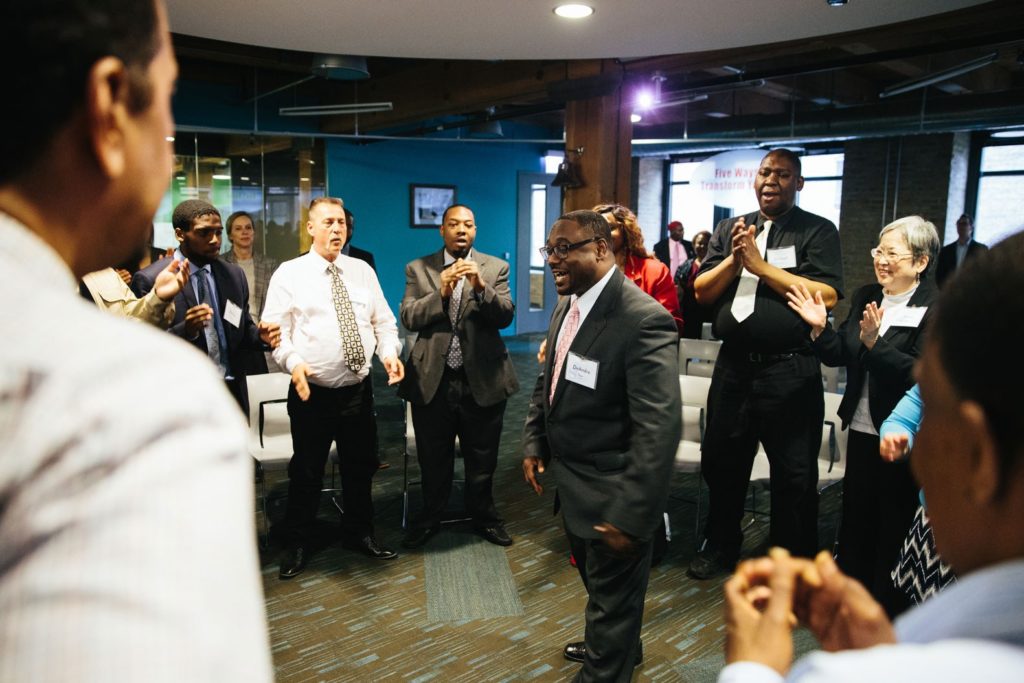
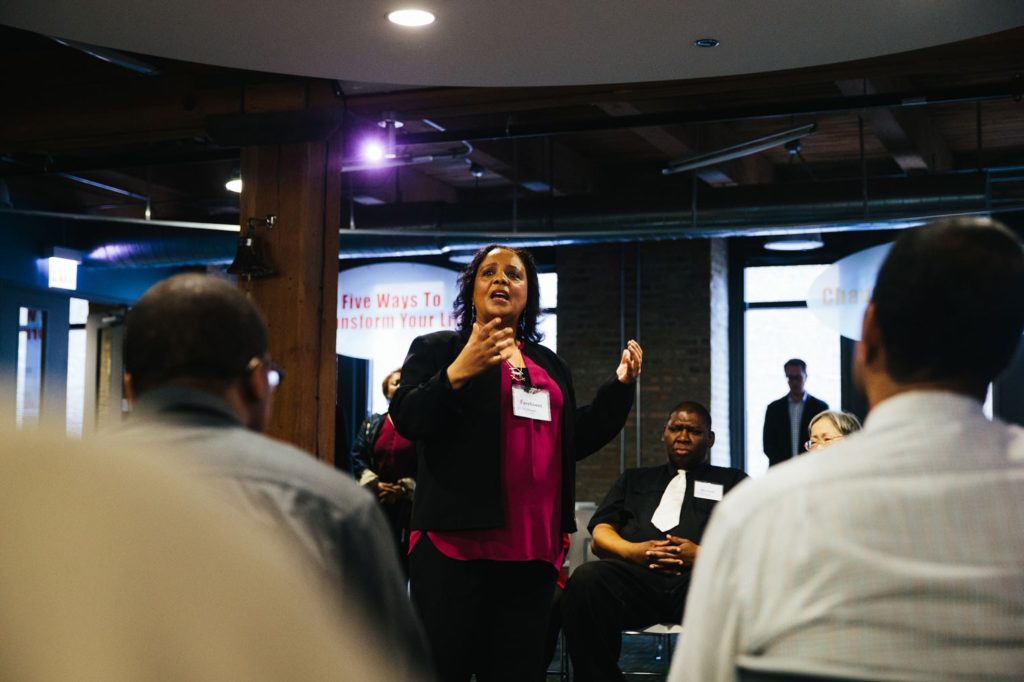
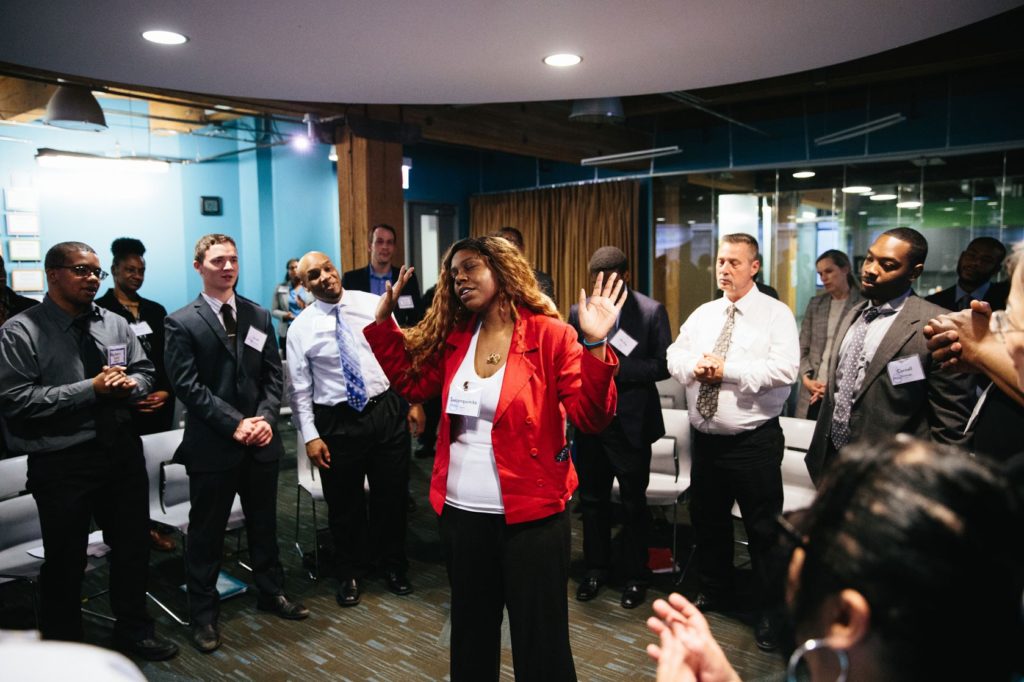
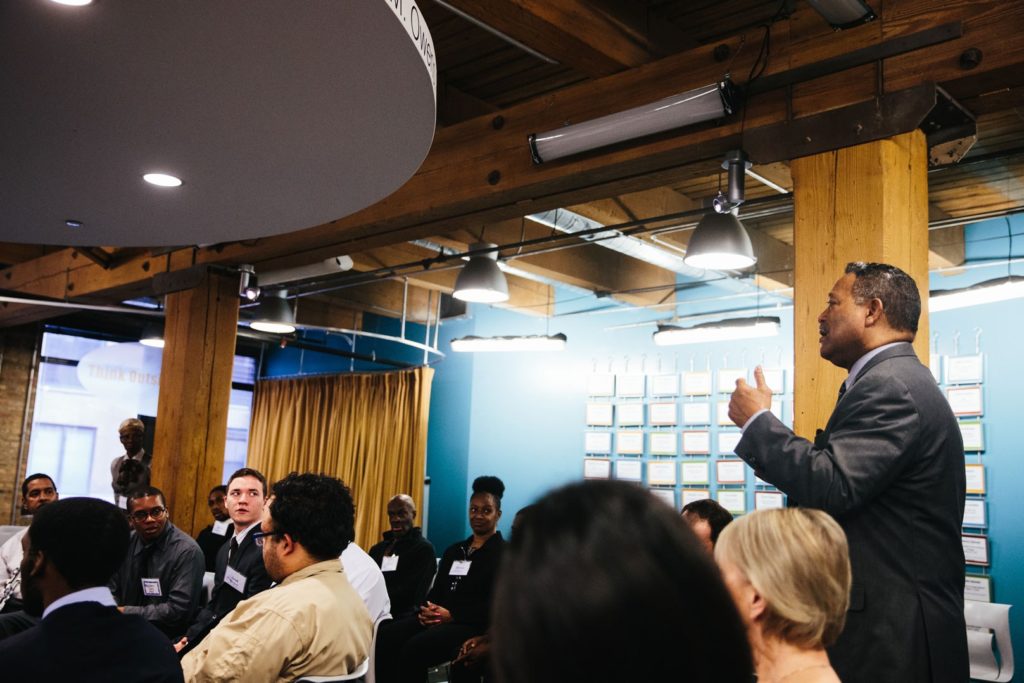
I ask Lavelle if there were any Motivations that were especially impactful for him. He scratches his head, smiles softly, and shares: "One day in particular, I was in the middle, explaining a particular situation that I was going through. I didn't think that I was speaking down on myself, but I said something along the line that I didn't have something. Jesse, from the back row, said loud amongst the quiet, 'You don't have it now, but you will soon.' When he said that, the amount of inspiration, I felt like I can run for President of the United States because this man said I could."
Peer support is Cara's signature. In fact the name Cara itself is the Gaelic word for friend. Every single person I spoke with mentioned how much the sisterhood, brotherhood, family has meant to them—every morning the gathering of a mutually uplifting and accountable community, circled up with the Great Wall of achievement behind.
"We pick each other up and we motivate each other on a daily basis," says DeAndre. "It's not just in the morning. That starts it, but it goes throughout the day, throughout the week, throughout the months. That's how it works."
"The emerging workforce—the millennial workforce and the generation behind them—are going to demand this more and more, so why don't we collectively, as employers, get in front and figure out how we can inclusively hire in a way that makes sense for us, and do it more rapidly?" asks Maria.
Though the Cara story is a hyper-local Chicago story, the organization will be turning thirty years old very soon and with that, stretching to think about what a national movement could look like and how they can be a part of that movement.
"It's both exciting and nauseating at the same time," admits Maria.
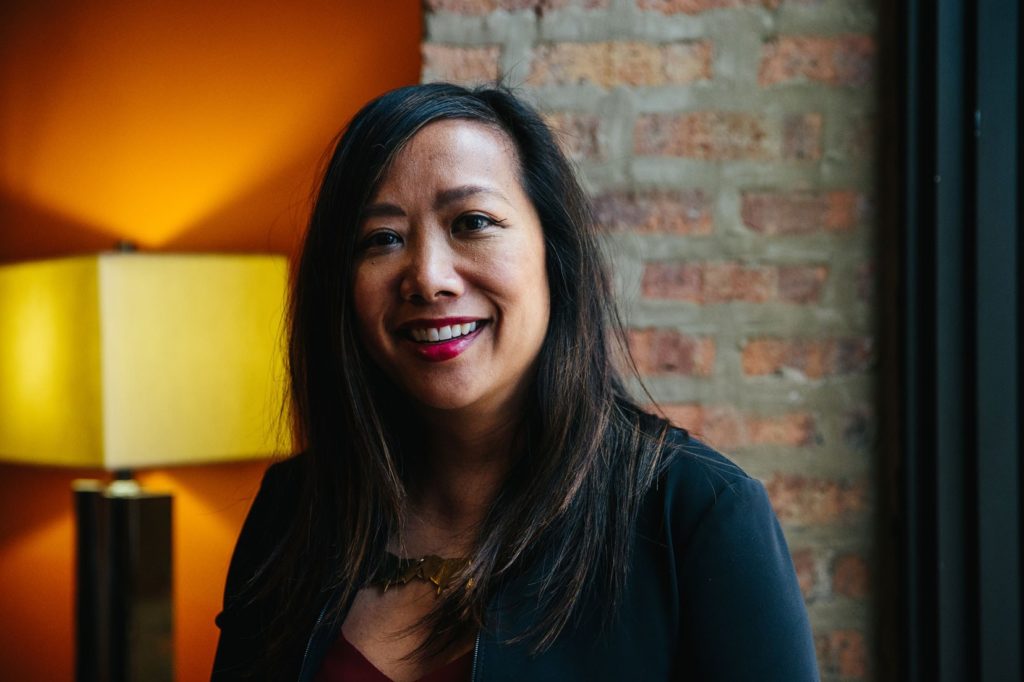
Over the last two years, Cara has received significant investments to support scaling their work into new markets. A million dollar investment from Stand Together Foundation, for example, enabled Cara to launch an affiliate in Atlanta in July 2019, partnering with Atlanta Mission—a renowned, 150-year-old, five-campus shelter operation. Recognizing the realities of recidivism within the shelter system, Atlanta Mission reached out to Cara to consider how to tailor the model for their context.
"The Cara method is kind of like a social technology," says Maria, "And so we are seeking to commoditize it so that partners like Atlanta Mission can integrate it in their organization, adopt the Cara method with their staff, and then subscribe to new innovations that we will create together over the years that follow."
"I think most employers want to do well and do good. Where they get stuck is that they don't feel safe asking the questions and don't understand what it is they could practically do," says Maria. To that end, Cara is also launching an institute to help employers revisit the way they hire and include differentiated talent.
"Think about an institute like an immersive boot camp where practitioners from around the country come, and they study the method with basic toolkits for five days basically and go back home and test stuff out. That will be a new innovation for us," she says.
From Odette to Da'Sean to DeAndre and Lavelle and Corinthian and LaTosha, Cara participants come from very different places and experiences and face many different challenges and barriers to employment, but one thing is consistent: Every single one of them, having been transformed, is committed to participating positively in the transformation of others and their communities. It's no surprise then, that Cara is beginning to look to the horizon, the broader national landscape, to consider who else they can lift up and help out. It's just a question of how to scale Chicago's miraculous.
Cara Collective is supported by Stand Together Foundation, which partners with the nation’s most transformative nonprofits to break the cycle of poverty.
Learn more about Stand Together's efforts to make the economy work for all and explore ways you can partner with us.
